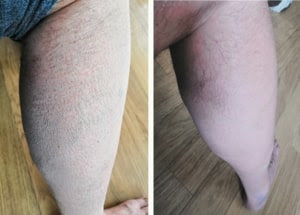Get Help for the Rare Disease Ichthyosis Congenita
Because of how they manifest in the human body, some medical disorders are uncommon because of how often they occur. One such illness is ichthyosis congenita. The query for the case was "therapy for ichthyosis congenita," and we received a patient with the illness. Our investigation revealed that the instance was unique hence- we felt compelled to alert our readers to it. We are available to answer any questions regarding the Ichthyosis cure, including how to recognize the condition and its symptoms. Continue reading!
What is the course of treatment for congenita ichthyosis?
Knowing the definition of ichthyosis congenita is a prerequisite for
treating the condition. It is also known as the "Liquor illness" and
is a rare genetic skin ailment.
Ichthyosis, according to NORD, is a collective term for a group of uncommon hereditary skin disorders distinguished by dry, thickened, scaling skin.
What variations of ichthyosis congenita are there?
You need to be aware of the different varieties of ichthyosis congenita.
What are these kinds reliant on? As stated by
How evenly distributed is the scaling across the body?
the manner of inheritance, the intensity of skin redness, and
The nature of any accompanying anomalies
The several forms of congenital ichthyosis:
a) Ichthyosis vulgaris, for example, is characterized by fine scales on dry skin. From white to dingy grey or brown, the colors are varied. The normal shedding of your skin is slowed right down by ichthyosis vulgaris.
b) Infants are susceptible to lamellar ichthyosis. Individuals who are born with it often have a collodion membrane, a tight, transparent sheath covering their skin.
c) Epidermolytic hyperkeratosis: This skin condition, which is present from birth, is epidermolytic hyperkeratosis. Babies who are affected may develop erythroderma, extremely red skin, and painful blisters.
How long will an individual with ichthyosis live?
The internal operations of the body parts are unrelated to this
condition. People with ichthyosis vulgaris generally have ordinary lives. Yet,
they'll probably always need to take care of their skin.
Is ichthyosis curable?
Rare diseases are difficult to treat. Nonetheless, ichthyosis
congenita is continuing to be cured. You are welcome to drop off inquiries for
any such ichthyosis congenita treatment you could require, just like our
patients from New Macedonia.
Ichthyosis is what kind of illness?
It is a genetic disorder, as we have already discussed. It has to do with the skin and also to receive therapy for ichthyosis congenita.
Does skin disease have autoimmune symptoms?
Sure, that certainly is possible. Depending on the type,
ichthyosis congenita treatment is issued. Acquired skin disease and autoimmune
disorders may be linked, which would guide an aberrant host immune response.
Merely said, the body has several internal reactions that can result in this illness. The majority of the symptoms are immune-related.
How soon does Ichthyosis start?
Understanding the signs and symptoms is essential
because doing so facilitates the treatment of Ichthyosis.
● They are initially
distinguished; by dry, scaly skin that typically covers considerable portions
of the body.
● Moreover, the skin may itch and
be red (pruritis) (erythroderma).
● Infants born with the disease
may have a membrane covering them at birth that looks parchment and is known as
the collodion membrane.
● The scales' appearance can
differ.
● Further issues may arise with
more severe Ichthyosis. Skin that has lost moisture becomes dry, constrictive,
and inelastic.
Is there a way to treat Ichthyosis congenita in India?
If we receive inquiries, we use GoMedii to our full
potential to locate the top hospitals offering "therapy for ichthyosis
congenita" for you. Yet, there are very few hospitals that provide such
treatments.
What is
congenital autosomal recessive Ichthyosis?
A heterogeneous collection of keratinization disorders
known as autosomal recessive congenital Ichthyosis (ARCI) is usually
characterized; by aberrant skin scaling over the entire body. Around two-thirds
of individuals with these skin-specific illnesses have severe symptoms.




Comments
Post a Comment